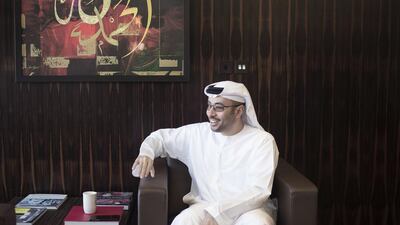One of Salem Al Noaimi’s aides has tipped me off that football is likely to figure in our conversation, so I am not surprised when the chief executive of Waha Capital goes straight into an analogy between the firm’s investment philosophy, the economic strategy of the UAE, and the business approach at Manchester City, the club he supports.
“In all three, we have taken a long-term view. Painful decisions have been taken, and will continue to be when necessary. But the basic approach is to plan long term for the future, and that’s paying off for us, the country and the football club. We are planting seeds, and the fruits will be seen in a few years time,” he says.
Seeing the potential value in long-term investments has been an essential feature of Waha Capital’s strategy since its origins as Oasis International Investments in 1997.
Identifying future value, and choosing the right time and mechanism for realising that potential, has become its modus operandi in businesses ranging from aircraft leasing to health care through to energy services.
Now, Mr Al Noaimi – Swiss and American-educated but very firmly one of Abu Dhabi’s new generation of rising business leaders – believes he has spotted another sector ripe for exploitation – asset management.
Its capital markets division has been active in credit and equity markets for the past five years, managing internal portfolios, the next five will involve an expansion into a fully-fledged asset management division, with funds open to outside investors on a fee-paying basis.
It comes at a propitious time for the capital, as it launches the Abu Dhabi Global Market (ADGM), the financial free zone with a big emphasis on asset and wealth management. “I’m very bullish on ADGM. It typifies the Abu Dhabi philosophy, and our philosophy: find the right people for the job and plan for the long term,” he says.
He says that Waha Capital may decide to base some of its asset management business in the free zone on Al Maryah Island, which would make it among the first of a group of financial institutions to seek ADGM registration, although retaining a big presence in its current headquarters in the prestigious Etihad Towers office block.
Some way down the line, Mr Al Noaimi believes, after the establishment of the new funds, asset management may grow to rival the principle investments business, which has hitherto been the dynamo of Waha Capital’s growth.
It all began with aircraft leasing, the firm’s original focus back in the 1990s, which turned into a positive gold mine.
“We’ve always liked aircraft leasing, but decided back then that we were too small to be a force in a very big but cyclical global business. We took the decision to diversify,” Mr Al Noaimi says. The complex financial deal that resulted in 2014 released about US$1 billion of capital for the company while it retained a 12.6 per cent stake in AerCap, creating the ability to borrow against that. “It was a transformational transaction for us,” he says.
The increased financial firepower the deal gave Waha Capital has been used in businesses where, true to strategy, Mr Al Noaimi sees long term potential value, regardless of short-term considerations such as the comparatively low oil price.
“We think now is the time to deploy capital in specific areas. Cheaper energy makes some sectors more interesting. You cannot let the economic noise distract you,” he says.
One such area has been Dunia Finance, a business involved in consumer credit and small business lending, which Waha Capital shares with big investors Mubadala Development and an arm of the Singaporean wealth fund Temasek.
Dunia has been the focus of speculation that it might be sold to a trade buyer or exited via an initial public offering, and Mr Al Noaimi admits he is considering a “strategic initiative” for the business. But he adds: “I don’t think market conditions are really right now for an IPO. It’s very hard for any- body to convince us that we should sell it. It really is a jewel.” He adds that forthcoming financial figures will prove how good a business Dunia is.
Another fast-growing sector identified by Waha Capital for investment is health care, in which he invested in 2013 via the Anglo Arabian Hospitals (AAH) business. “It’s a big opportunity, what with mandatory insurance coming in and the background of strong demographic growth,” he says.
AAH’s pharmacies, clinics and hospitals are all over the UAE, but he sees strong growth in the Northern Emirates, and is planning to open a hospital in Ajman before the end of this year.
“It could be a candidate for IPO at some stage, but maybe in two or three years. We are flexible and have liquidity, so we don’t have to think about selling,” he says.
Rounding off principle investments are the interests in energy services, through the long-standing investment in Stanford Marine Services and the newer one in National Petroleum Services, and industrial real estate via the Al Markaz development.
“Energy services will be a key opportunity over the next few years, despite the oil price. There may be some pressure at the moment but there is still a lot of potential. We plan to deploy Dh4bn across all sectors over the next three years,” he says.
Waha Capital is quoted on the Abu Dhabi Securities Exchange, and Mr Al Noaimi is a firm believer in the public company values of strong governance and accountability.
“We have a world-class governance framework,” he says, which is what you would expect of an Abu Dhabi corporation backed by some of the emirate’s biggest business names. “We wanted our money run in the best way possible,” he says.
Waha Capital is long term, strategic and visionary, but at least in one respect Mr Al Noaimi is thinking rather shorter term. “We have to stop Arsenal in the English championship,” he says. How laudable.
fkane@thenational.ae
Follow The National's Business section on Twitter

